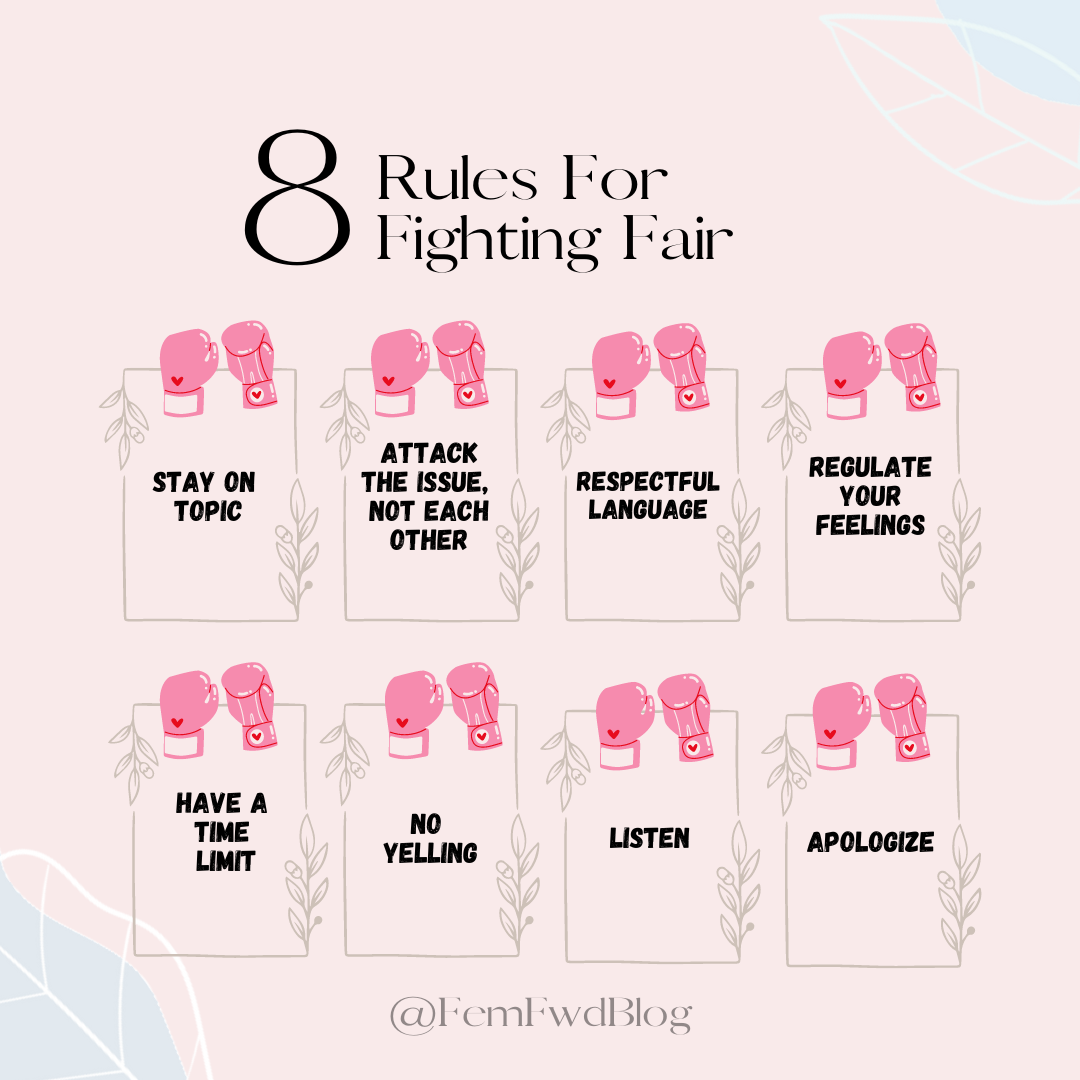Fair Fighting: Why it Matters and 9 Rules a Therapist Recommends for Fighting Effectively
If you are in a marriage, or in any relationships for that matter, fighting and disagreements are inevitable. One of my old psychology professors used to say, “If you are treating a couple that says they never fight then they are either lying or not talking to each other.” Fighting is not a problem, but how we fight with our partner can be a problem. John Gottman, Clinical Psychologist, found that stable couples have a 5:1 ratio of positive to negative interactions during conflict. This is referred to as the magic ratio. How we fight with our partners is an indicator of the overall health of the relationship. It can also help predict relationship longevity and satisfaction. That’s why this article is focused on fighting better, rather than reducing the frequency of fights in relationship.
Why does fighting fair matter?
Fighting in a damaging and ineffective way erodes relationships over time. It creates less safety and trust within the partnership. A destructive style of arguing can also reduce willingness to share and come together over time, creating less intimacy and conflict avoidance.
Furthermore, fighting effectively has the potential to grow the connection in the relationship. This is true because it sometimes means that there is a resolution to the problem which reduces stress, but more importantly it speaks to the fact that there is healing power just in being heard, seen, and understood by our partner, even when there is no real resolution to the problem (and there often isn’t a resolution).
Another added benefit for parents is that fighting fair offers wonderful modeling for their children. Children are learning the skills needed for arguing well and seeing that healthy relationships not include arguments, but that these arguments can be conducted in a way that feels safe.
Rules for fighting fair
Of course, this is not an all-inclusive list. These are the rules of engagement I have found most useful for my therapy clients and for my own marriage. I encourage any couple to sit down and make their own rules for arguments, based on their unique needs and personal histories.
You are responsible for awareness and regulation of your emotional temperature- It is really hard to have an effective argument when one or both parties is super amped up or very dysregulated. This isn’t to say that you can’t be emotional or passionate in any argument, rather it’s I am saying that it is important to recognize that there is a tipping point where emotions become so big that they are hurtful and not helpful to the end goal.
Warning signs that emotions are too high- Confusion about what the argument or discussion is even about, losing track of what you or the other person were trying to say, intense physiological sensations, and destructive behaviors like name-calling, yelling, etc.
Remedy- Agree to take a break and on a time to come back together to continue the discssion. Use that break time to engage in activities that reduce arousal, such as taking a walk, taking a hot shower or bath, relaxation exercises, watching a funny or soothing show, etc. Do not use the break time to ruminate or to engage n activities that deepen negative affect.
Read more about the barriers to effective communication, including ways to manage your own emotional temperature.
2. Be respectful - This means no name-calling, no cursing or other foul language.It also means no yelling or sarcasm.
3. Agree on what the argument is about- It’s really common for folks to start approaching a heated topic and actually be talking about two different things. Take a moment and identify the problem together. For example, let’s say your partner is upset about not spending enough time together. Take a moment and hone in on the issue. Does your partner want to address feeling like not enough time was given this week and how joint activities were cancelled or not even established in the first place? Or does you partner want to discuss a general pattern of not feeling prioritized in the relationship? Those are two very different discussions.
4. Focus on one thing/problem at a time- It’s really common for couples to do what is called “Kitchen sinking” and this is when couples stray from the issue at hand and start talking about everything that is bothering them (or maybe even ever has bothered them).
Remedy: 1) Identify and agree on the issue/problem that is to be discussed, 2)Ask if it’s ok to remind one another of the agreement, 3) Offer gentle reminders, when necessary, and 4) Agree to set aside other issues that emerge for another time.
5. Talk less and listen more- Have you ever been in an argument and realized that you have no idea what your partner just said? I know I have. Listening is the cornerstone to good communication and is key to arguing effectively. Listening allows us to perspective take, have empathy, and to deepen our understanding of our partners distress or thoughts processes. So, set your stuff aside and try and be curious about your partners experience.
Warning signs you are not listening well: The biggest sign is catching yourself formulating what you are going to say before your partner has even finished speaking. Other signs include giving into distractions (i.e., checking your phone, glancing at the TV) or having the conversation in a distracting environment, your partner starts to look and behave emotionally shut down, or your partner starts to share less and less information with you.
Read our article on Listening if you’d like to learn more about this important skill.
6. Use I-Statements- I-statements, as compared to you-statements, require that you take ownership of your own feelings. They reduce defensiveness and facilitate conversation. Let’s compare the felt experience of an I-statement versus a you-statement.
I-Statement: “I feel frustrated and disappointed when you don’t call me in the evenings when you are out of town.”
You-Statement “You are so frustrating! You don’t take the time to call me int he evening when you go out of town.”
The latter shuts down conversation. It does not invite conversation, problem-solving, or collaborative sharing.
7. Don’t play the blame game: While enticing, no one wins here. You need to decide whether it’s more important to be right or to be married? Stick to the facts, use I-statements, and make generous assumptions of your partner.
8. Watch your tone and body language- Most of communication is non-verbal. How you say something matters just as much or more as the words coming out of your mouth. This means drop the sassy tone and adapt an even, normal volume when talking it out with your partner. It also means watch your body posture. Crossed arms and eye rolling, while valid urges, aren’t productive or effective in arguments.
9. Set a time limit- Don’t let a fight go on forever. It’s not necessary and it degrades the communication and each partners ability to cope well during the interaction. Find the sweet spot for your partnership and agree to take a break when the time is up. Always agree on a general timeframe to come back together to continue the discussion so that a healthy time limit doesn’t turn into an unhealthy avoidance of conflict.
Focus on the repair
What’s just as important as how we argue is what we do after the argument. Remember to repair the rupture with your partner, even if the issue at hand isn’t solvable. Taking accountability and ownership shows your partner that they matter and that you are willing to take to work towards change. Repairing with your partner can come in the form of an apology, showing up/behaving differently, and/or revisiting and checking in about the prior issue or the ongoing issue (“How are you doing since our argument last week?” or “How are we doing?”).
Repairing also brings awarensss to your particular relationship dance (especially the parts where you are stepping on their toes). Bringing awareness to the repair process itself is so important because you start to realize what your partner needs in order to feel things have been mended. In turn, you’ll start to realize what you need, too.
What does a good apology sound like?
There are some general components that make for a good apology. These steps include, 1) Express regret, 2) Take ownership/responsibility, 3) Offer restitution, 4) Commit to change, and 5) Request forgiveness.
To drive home the point, let’s compare a bad apology to a good apology.
Bad Apology: “I’m sorry, I didn’t realize you were so sensitive.
Good Apology: “I realize I should have brought up such a sensitive topic in a gentler way. I’m so sorry!”
The latter takes ownership, does not blame or make excuses for the behavior, and commits to doing it differently in the future.
If you’d like to learn more about repair, read our article now!
Aim for progress, not perfection
We don’t have to show up perfectly to be married well. We need to have a genuine commitment to learning new skills and showing up in ways that preserve and bolster our relationships. Fighting fair is one of those skills that will help your relationship stand the test of time. I encourage you to sit down with your partner and create ground rules that help you fight more effectively.
We encourage you to check out our workshop on How To Communicate Better in your relationship, as a lot of this skills are reviewed and taught in depth in that course.
Relationship Advice For Women
As always, thanks for reading! We are all about teaching people, especially women, who to have more satisfying relationships. Sign up for our newsletter to receive our newest blogs right to your inbox!



